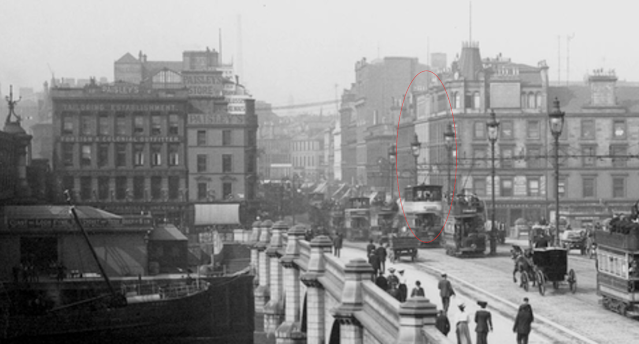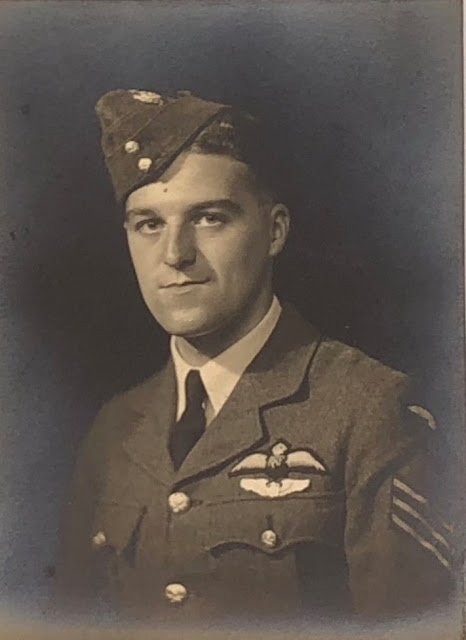Cyril Sykes Whiteley
Cyril Sykes Whiteley was born on 15th June 1898 at 15 Hamilton Terrace in Partick. This was subsequently renumbered as 47 Peel Street, opposite the cricket ground in Partick:
Number 47 retains the bay windows; note the rest of Hamilton Terrace would have been to the left of the photo. The modern properties replace those destroyed by a landmine on the night of 13th/14th March 1941, the Clydeside Blitz, when approximately 36 people died here.
The family stayed here until 1907. Cyril's father, Sykes Wheatley, gave his occupation as "writing master". He ran Whiteley's Business Training College" at 75 Jamaica Street, describing itself as a school of shorthand, typewriting, bookkeeping and "civil service academy". Number 75 was at the river end of the street, long gone under modern buildings.
This photo is from 1905 showing the location of number 75 in the red oval, centre-right of the picture.
Cyril had four sisters: Margaret and Ethel May were older, Eva and Sophia were younger.
In 1907 they moved to Bearsden, to a house called The Yews in Rosevale Road - not clear which modern address this relates to.
The area as it looked in 1949 (there is no map on this scale for the period around 1910). Drymen Road runs from the top to bottom of the map, Bearsden Station to the left, Rosevale Road immediately south of the railway to the right.
Most of what we know about Cyril comes from the papers he signed when he joined the army a few days before his 18th birthday, on 14th June 1916. His hair was dark brown, he was 5 feet and 10 inches (178cm), 140 pounds (64kg), and had a 36-inch chest (91cm). His eyes were also dark brown.
On 30th January 1918 he was posted to the 1st/8th Battalion, Argyll and Sutherland Highlanders in France as a private:
Paris is at the bottom of the map, the area where the 8th Battalion was in the line is shown by the red oval towards the top right corner.
The German attack broke on the frontline on March 21st. The battalion had just gone into reserve and was preparing of a training exercise (a 'battle game')
The front line was penetrated and the battalion was heavily attacked on the 21st, continuing into the 22nd. At about 2pm on the 22nd, the Germans started to breakthrough on the flanks and the battalion had to withdraw. A new position was taken up but further heavy attacks followed. The battalion withdrew again during the night. On the 23rd the battalion retreated across the River Somme although the diary gives the impression that there were few if any casualties.
Somewhere in this 72-hour period, Cyril vanished. While the battalion war diary makes the battle seem neat, ordered and well-controlled, we can imagine some degree of confusion, even localised chaos, with troops losing sight of each other and only reforming units like platoons when the situation stabilised. When this happened, Cyril was missing. He was the new man, only arrived six weeks earlier and maybe he didn't have close friends looking out for him.
Checking the details in the war diary, on the 21st 15 men were killed, 106 wounded and 144 missing. The equivalent figures for the 22nd were 6, 39 and 17, and for the 23rd they were 0, 5 and 4. The importance of this is that the CWGC record of Cyril's death dates it to the 23rd, which is indeed possible - but in the absence of definitive data it is more likely he died on the 21st.
But the lack of definitive news of what happened to him left his parents in limbo. there were at least two queries from them to the International Red Cross asking them to search their records of prisoners of war.
"Negatif envoye" means a negative reply was sent, he was not on the list. Then in October 1918 there was hope - he was said to be a prisoner:
This is from the Milngavie and Bearsden Herald for the 18th October. But it turned out to be false - in fairness to the authorities involved I can say from my searches there were a lot of missing and killed British soldiers with very similar names. It does seem to have taken a long time to resolve, the following letter is dated January 1920, fourteen months later and the mistake is finally being recognised:
Cyril is commemorated on the Pozieres Memorial:
He is one of over 14,000 British troops with no known grave.
Footnote: his father's business, from this invaluable website:
Whiteley’s Business Training College
WHITELEY’S Business Training College, School of Shorthand, Typewriting, Bookkeeping, and Civil Service Academy, 75, Jamaica Street, Glasgow.
Principal:—Mr. Sykes Whiteley.
It is a universally admitted truism, that of all phases of modern tuition, that which forms the basis of a good mercantile education is the most important, because the most needed ; and over and above the ordinary curricula of the Board Schools or Universities there is manifestly required some such course of training as that which has been conducted in Glasgow, during the past five years, under the title of Whiteley’s Business College.
The appropriate location of the College in the heart of the Commercial metropolis, while the course of training embraces every subject that is useful to Mercantile and Civil Service aspirants, strongly commends its objects and advantages to all desirous of acquiring a sound and carefully regulated knowledge of the more useful details of writing, arithmetic, book-keeping, shorthand, typewriting, composition, grammar, spelling, invoice work, and all the other requisites of clerical proficiency. Indispensable as shorthand has now become to the proper equipment of a Mercantile, Law, or Civil Service clerk, typewriting is destined to attain a similar place ; and this valuable art is imparted by Mr. Whiteley in conjunction with that of shorthand in such a manner as to enable students to secure readily the many remunerative situations which a knowledge of these combined arts now offers.
Notwithstanding the advances of shorthand and typewriting, the original longhand writing is yet an important matter, especially as regards rapid copying or transcription ; and as rapidity is not attained by any defined method of writing, Mr. Whiteley has endeavoured to develope the students’ own style in a manner calculated to give the maximum of freedom and fluency to the hand, the only different modes observed at this Institution being (1st) rapid business hand for mercantile and general correspondence, (2nd) official or Civil Service hand for Government offices, and an elegant free hand for ladies. While it is obviously impossible to here treat exhaustively of the numerous branches of tuition engaged in at this Business College, special reference may be made to the various matters which are absolutely essential, such as quick and correct casting-up of figures and calculations, the making out of invoices, accounts, current accounts, sales, writing letters, arranging papers, taking notes, &c., and the student thus encounters the whole routine of the counting-house, with this valuable distinction — that any error or inadvertency is courteously pointed out, corrected, and explained, so that by the time he enters employment, it requires the simplest effort to advance and promote his own interests.
Nothing better than this could be claimed for an establishment of the kind which Mr. Whiteley has so advantageously placed before the public. The whole details and rotation of tuition are as invaluable as they are simple and easily acquired ; and where, in many cases, the elaborate routine of the School or College has eluded the powers and faculties of pupils — otherwise expert and intelligent — Mr. Whiteley’s College has formed a valuable medium of improvement. That this is so cannot be better attested by the numerous testimonials, of which (during the comparatively short time this Institution has been established) Mr. Whiteley has been the recipient. By his efforts many apt pupils have found good situations, not only in the Post Office, but in other Government offices, and in many of those mercantile houses to whose clerical staff it is considered an honour to be appointed. Ladies pass from this College to remunerative employment in the Commercial and Civil Service spheres, and the many appointments now open to all females must form a special inducement at the present day when the other forms of ordinary employment are not only overcrowded but unremunerative.
There is also a junior department, under the joint direction and supervision of Mr. and Mrs. Whiteley who are assisted by competent teachers, and the whole work of the Academy progresses with a smoothness and regularity highly favourable to the successful carrying on of all its various branches and departments. As a professional writing master and expert in hand-writing, Mr. Whiteley has done much to stimulate the work of penmanship by the introduction of a Rapid Writer’s Pen, while a valuable concomitant thereof is presented in his Brilliant Blue Writing Fluid, and every specialty in pens, ink, and books is adopted and recommended by him as soon as its usefulness is recognisable.
To persons at some distance from Glasgow, ready communication is obtained by letters addressed to the College, 75, Jamaica Street, or to his private residence, 15, Hamilton Terrace, West Partick, Glasgow, while his Prospectus affords an insight into the objects and advantages of that Institution, whose leading features have been accentuated in the present review.













Comments
Post a Comment